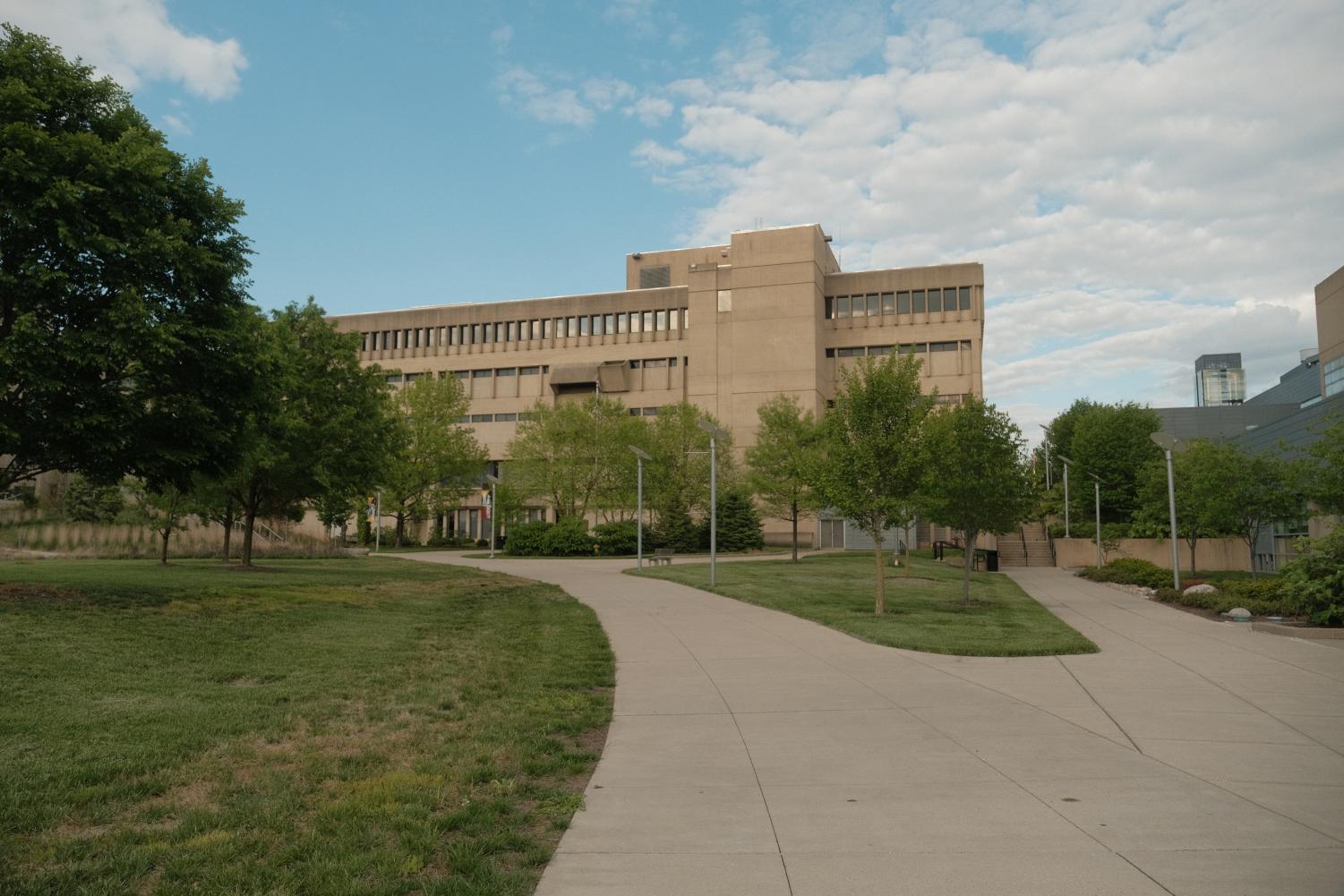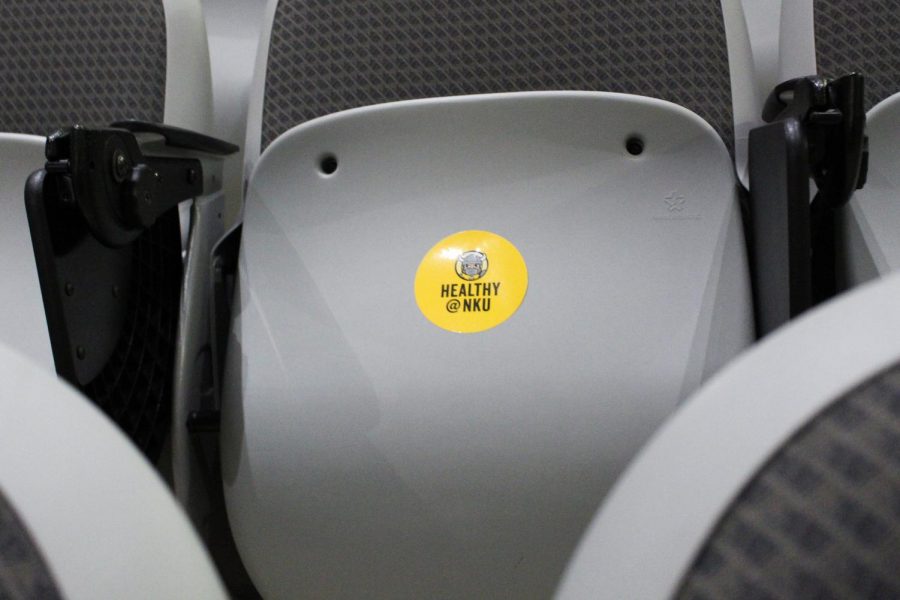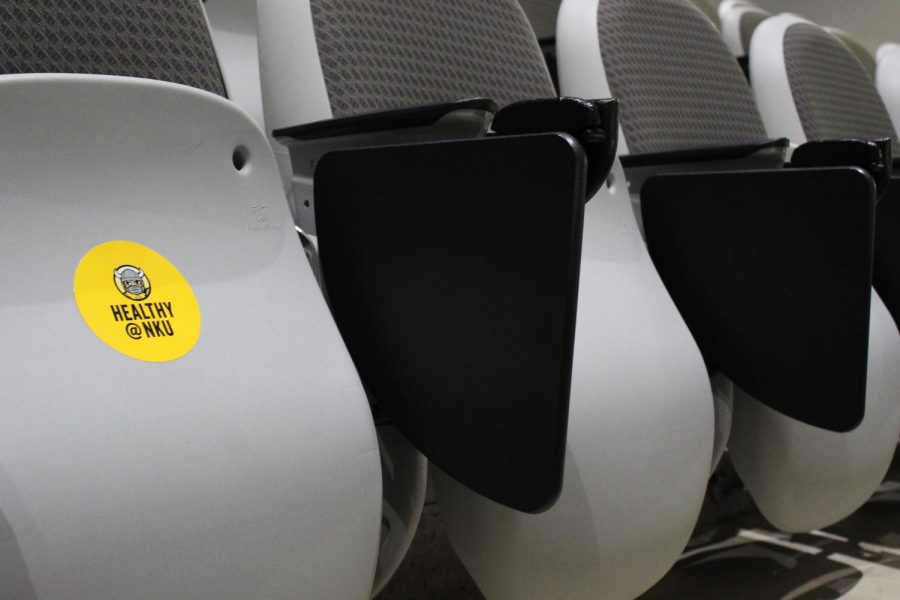In MEP 200, there are stickers indicating what seats are available to be sat in.
Being a dean during a pandemic
Deans of the college of law, business and arts and sciences share COVID-19 challenges and successes
September 7, 2020
Although school started mid-August, the deans on campus have been planning how the semester would look amidst a pandemic for months. As the semester progresses, these deans need to stay attentive to what’s best for their colleges.
Judith Daar, Hassan Hassabelnaby and Diana McGill, deans of the college of law, business and arts and sciences respectively, shared their experience of the past few months and anticipation of the next few to come.
Dean Judith Daar, Salmon P. Chase College of Law
Judith Daar answers the Zoom call from her office on the fifth floor of Nunn Hall. Behind her are large windows that look out onto campus. Daar said she loves her office and being on campus. She is also teaching classes this semester face-to-face.
The semester so far, according to Daar, is going “surprisingly well” and she attributes most of this to a lot of planning on the part of many people over the past few months.
“I’ve been in meetings almost on a daily basis that look at every aspect of our program,” Daar said. “We’ve had a lot of support from everything from the facilities department, to academic affairs, to IT. Everybody has been just incredibly collaborative and collegial and working hard to make sure that we could open in a safe and productive way.”
Daar said approximately 55% of the law’s school classes are taught online while the other 45% are taught face-to-face.
Chase Law faces the unique challenge of having almost none of its classrooms able to accommodate the size of a first-year class, which are usually around 50 students, while maintaining social distance, according to Daar.
Chase has classes in Griffin Hall, the Student Union, the Health Innovation Center and the University Center, Daar said.
The law library is still open with safety precautions such as reduced seating and study spaces, plexiglass protection for high traffic areas and protocols for the safe sharing of materials.
Legal education relies heavily on experiential learning and hands-on practice of law—from interviewing clients, to taking depositions, to filing pre-trial motions before a judge—and it has been very challenging to recreate during a pandemic, according to Daar.
“These are all very personal kinds of activities and relationships that lawyers form with their clients, with judges, with other lawyers, with the community. Replicating those experiences online has been, I would say, the most challenging aspect of delivering our product to the student body,” Daar said.
Daar said there has been a trade-off. While professors may not be able to focus on practice-oriented teaching, they can now focus on knowledge-oriented teaching or didactics.
“Our trial advocacy faculty have said, ‘we can really focus on the rules of evidence now, what can come in as evidence, what’s excluded and so on, because we have so much more opportunity for just didactics,’” Daar said, “But while we’re enhancing the rule aspect of it, we are completely losing the stylistic and kind of persuasive aspects of advocacy that really you can only get in an in-person setting.”
Clinics have also been hampered by protocols put in place by the community. Law students can complete clinics in which they receive hands-on law experience while being supervised by law professionals.
In a constitutional litigation clinic, students will assist incarcerated individuals but many prison systems are not allowing students to visit the prisoners or communicate with them over Zoom, according to Daar.
Daar said she worries everyday that she may receive a message that there has been a spike in cases and NKU will transition to online, but she is prepared for the worst.
“We have planned for this every day for the last five months, and we are ready, and we will do it seamlessly, and we will not skip a beat,” Daar said.
To make sure Daar stays in contact with both faculty and students during a time where so much information exchange is taking place, Daar hosts town hall meetings. The meetings took place every week in March then took a break during the summer, but have started back up again this semester.
“I just let everybody go around and say ‘hello’ and I do sort of a wellness check to see how everybody is doing and then whatever the topic of the day is, we can chat about your thoughts, your questions, and I think it’s worked pretty well,” Daar said.
For students and faculty struggling during the pandemic, Daar shared resources Chase Law has available. For students in need of financial support, Daar said there is the Chase Bridge Fund which was awarded to around 20% of Chase’s students.
The Chase Bridge Fund was created from a fund alumni created several years ago in honor of the highly respected and admired Professor Caryl Yzenbaard when she retired, according to the college’s facebook.
“It’s not a huge amount [of money] but the fact that we can help so many students was really meaningful and I know that the awards were very helpful to the students who received them,” Daar said.

Dean Hassan Hassabelnaby, Haile U.S. Bank College of Business
Hassan Hassabelnaby has also spent the “unusually busy” summer preparing for the fall semester. At a college level about 50% of classes are completely virtual and the other 50% have some in-person component, according to Hassabelnaby.
Hassabelnaby said the format of each class was determined by what he refers to as the “COVID capacity” of the classrooms or the amount of students who can safely be in a room while socially distancing. A classroom may have a regular capacity of 50 students, but a COVID capacity of 17.
Hassabelnaby said each classroom is supplied with sanitizing material for professors to clean their station or desks and chairs if they feel inclined to.
If more students are registered for a class than there is space, the class will operate in a hybrid format. For example, if a class is Tuesday/Thursday, the first group of students will come to class in person Tuesday while the second group attends class online. On Thursday, the groups will switch.
“I’m really so happy that students are committed,” Hassabelnaby said. “They are here with their masks. They are not moving different furniture to come close to each other … they are sanitizing before and after. In our building specifically, there is a very high level of commitment from both instructors and students.”
All offices in the college are open but are operating in a reduced capacity, according to Hassabelnaby.
Hassabelnaby said he has encountered a few challenges when the college started considering what Fall semester would look like. The first challenge was whether students would wear their masks in the classroom and how to accommodate those who, for health reasons, could not wear one.
Another challenge was how the college would provide the same learning experience to its online students as it would in person.
“Students who are taking online classes should not be in any way, getting less quality education than what they would have if they are in the classroom and in person,” Hassabelnaby said.
To ensure this, Hassabelnaby said faculty spent the summer doing two things: attending the summer online faculty institute (SOFI)—a one week training for faculty that will be teaching online to make sure that they will be able to get the same teaching experience to students—and having “brown bag” talks every week in the summer to talk about one issue related to online education.
“I would say we’re a little more ready than maybe other institutions simply because most of our faculty taught online before the pandemic,” Hassabelnaby said. “When I say this is probably about 70% [taught online] so transitioning to online in spring, while it was a challenge but we were ready for the challenge.”
Like Daar, Hassabelnaby said there was concern with how to do experiential learning, such as internships and studying abroad while online.
“I think we did a reasonable job here in summer and we definitely learned a lot from what we are doing now in fall. But we do have a standing committee that is really looking at this issue specifically,” Hassabelnaby said
Studying abroad was replaced with an online project with professionals from around the country with the students from other universities in this country. Two other programs were created internal micro-internships and external micro-internships, according to Hassabelnaby.
During an internal micro-internship, students can work on a real project for 20 to 40 hours a week on a specific project for the college or university. For external micro-internships, Hassabelnaby said, the college uses a website called Parker Dewey where businesses can post projects and students can submit their resume and work on a project remotely for up to 40 hours.
With circumstances continually changing, Hassabelnaby said his faculty spent the summer preparing to transition their class any time to completely online if the university asks them to do so.
“I would say they are teaching in person, but in the back of their mind they have a lot of material online, that could be easily for the site to go completely online,” Hassabelnaby said.
Hassabelnaby said faculty who have taught online are helping those who have not, and he appreciates his team.
“We have a great team here and instructional designer course development staff. The faculty really were kind of peer mentors and helping each other,” Hassabelnaby said.
Hassabelnaby encourages students in the college of business to meet with the center for student inclusiveness if they are struggling.
“They are all available to help the student with any academic question, personal questions or if they have some issues like stress they will refer them to the right person at the university level,” Hassabelnaby said.
Hassabelnaby said that he is proud of his students and team and the wonderful job they have done.
“I’m happy at this student’s level of commitment to protecting each other and protecting the students and I’m hoping that we’ll be able to finish the semester the same way without transitioning to online,” Hassabelnaby said.

Dean Diana McGill, College of Arts and Sciences
College of Arts and Sciences Dean Diana McGIll oversees the largest of any college housing more than 100 programs, five academic centers and greater than 5,200 students, according to the college’s website.
Due to this, McGill said it’s difficult to get a percentage of how many classes are being taught online and how many are being taught face to face.
For example, the natural sciences have a lot of classes with face-to-face components such as labs and the visual arts, like ceramics, have a lot of hands-on components that must be taught in a classroom.
According to McGill, a lot of research and thought has happened over the summer into how classes that must be taught face to face can be done safely—especially in regards to the performing arts.
In an ensemble, performers will traditionally stand in a U-shape and face each other to help stay in sync. Now they must stand in a straight line distanced from each other, McGill said. Students are also limiting their time performing together and a lot of music is being done outside when possible.
McGill said instructors are also wearing amplifiers over their masks as another safety precaution so students can hear them better when they are directing without the instructor having to yell or get too close.
Another example is a ceramics classroom. Instead of students getting close to the instructor to see their technique, with help from IT, students can now sit at their own wheels and watch the instructor from a large screen that has a view from a camera on the instructors wheel.
“Things that you may never have thought of, the school of the arts has had to think really deeply about,” McGill said.
Labs have also had many changes, McGill said. Similar to hybrid classes in the College of Business, students will be split into two groups with one group attending in person while the other attends online and vice versa.
Some labs have always required the use of gloves, such as microbiology, but now gloves are mandatory in labs where students are continually touching equipment that may not be able to be wiped down in between uses.
McGill admits there are just some challenges that she has not been able to mitigate such as international students coming to NKU to study in their labs.
“Some things like study abroad is something we haven’t yet figured out how to reproduce. Some of the internships, our students are finding virtual internships. It is hard because companies are trying to figure this out at the same time for their own product productivity,” McGIll said.
There is also a challenge, according to McGill, of the “unknown juggling between face to face and virtual” and having to create multiple learning experiences for a large number of students.
“Now we have a lot of students who are having to miss and not necessarily because of COVID but because of the pandemic. So faculty are having to create two learning experiences, practically every class that we’re teaching,” McGill said.
Like law and business, McGill’s college has spent the summer preparing for a possible reclosure of the university.
“I’ve talked a lot with our chairs and directors about getting your faculty ready to do that, should they have to. Labs are hard, studios are hard,” McGill said. “We certainly have now lived through the experience in the spring where we didn’t get [a] warning. So now we’ve had a whole summer to think about what that might look like if we have to do it again.”
McGill said she was impressed with the work her faculty did over the summer to learn how to teach online whether they were going to in the fall or if they had to transition quickly but a summer is still a short amount of time to build multiple classes.
“Even having this summer, which is better than nothing, is not typically when you recreate core courses, you would typically create one online course in that time period,” McGIll said.
Students are also facing the challenge of learning online if they haven’t done it before something. McGill said it “is not easy.”
McGill hasn’t held a town hall for students this semester and said it is difficult to hold a virtual meeting with a college with thousands of students. McGill does hold occasional talks for faculty called “tea with the dean” and sends out a weekly newsletter to update faculty and staff.

For more information about how NKU is handling the COVID-19 pandemic and moving forward visit their COVID-19 website.

